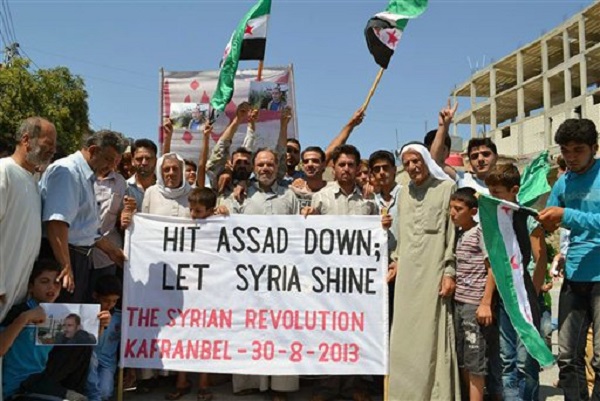A look at Syria developments around the world

This citizen journalism image provided by Edlib News Network, ENN, which has been authenticated based on its contents and other AP reporting, shows anti-Syrian regime protesters holding a banner and Syrian revolution flags, during a demonstration in Kafr Nabil in Idlib province, northern Syria, Friday, Aug. 30, 2013. AP
The United States is considering launching a punitive strike against the regime of Syrian President Bashar Assad, blamed by the U.S. and the Syrian opposition for an Aug. 21 alleged chemical weapons attack in a rebel-held suburb of the Syrian capital of Damascus. The U.S. said the attack killed 1,429 people, including at least 426 children. Those numbers are significantly higher than the death toll of 355 provided by the aid group Doctors Without Borders.
Here’s a look at key Syria developments around the world Saturday amid heightened tensions over potential military action:
SYRIA:
The United Nations experts investigating the alleged chemical strike left Syria after conducting four days of on-site visits. Associated Press journalists saw the U.N. personnel enter Lebanon from Syria through the Masnaa border crossing and then drive in a 13-car convoy to the Beirut airport. Later Saturday, the team was flying to the Dutch city of Rotterdam on a German government-chartered plane, the German Foreign Ministry said. Syrian state TV broadcast images of Syrian soldiers training, fighter jets soaring in the sky and tanks firing at unseen targets, to the backdrop of martial music.
THE NETHERLANDS:
The Organization for the Prohibition of Chemical Weapons, based in The Hague, was expected to receive from the U.N. experts blood and urine samples taken from victims of the attack as well as soil samples from affected areas. The samples will be divided so each can be sent to at least two separate European laboratories for testing. The OPCW declined comment on how long it would take to receive results, but experts said the process lasts at least several days.
RUSSIA:
President Vladimir Putin urged President Barack Obama not to rush into any decision on striking Syria, and to consider whether strikes would help end the violence and be worth likely civilian casualties. Putin in a statement advised Obama to reflect on the results of U.S. military intervention in Afghanistan and Iraq before deciding whether to launch air strikes against Assad’s regime.
UNITED NATIONS:
U.N. disarmament chief Angela Kane was scheduled to brief Secretary-General Ban Ki-moon on the investigation conducted by the experts into the alleged chemical attack.
MEDITERRANEAN SEA:
Five U.S. Navy destroyers were in the eastern Mediterranean Sea waiting for the order to launch. The destroyers are armed with dozens of Tomahawk cruise missiles, which have a range of about 1,000 nautical miles (1,151 miles, 1,852 kilometers) and are used for precise targeting. The missiles fly at low altitudes, and their range allows the ships to sit far off the coast out of range of any potential response by the Syrian government. French military officials confirmed the frigate Chevalier Paul, which specializes in anti-missile capabilities, as well as the hulking transport ship Dixmude were in the Mediterranean for training and operational preparations but denied any link to possible Syria operations.
UNITED STATES:
If he gives the order for a strike against Syria, Obama would become the first U.S. leader in three decades to attack a foreign nation without broad international support or in direct defense of Americans. Only France has indicated it would join a U.S. strike on Syria. Not since 1983, when President Ronald Reagan ordered an invasion of the Caribbean island of Grenada, has the U.S. been so alone in pursing major lethal military action beyond a few attacks responding to strikes or threats against its citizens.
FRANCE:
Nearly two-thirds of French people oppose military intervention by their country in Syria, according to a survey released by polling agency BVA. The Aug. 29-30 telephone survey polled 1,010 French people over age 18. It found that 64 percent oppose their country’s participation in a possible military strike targeting Assad’s regime. The margin of error was plus or minus 3 percent.